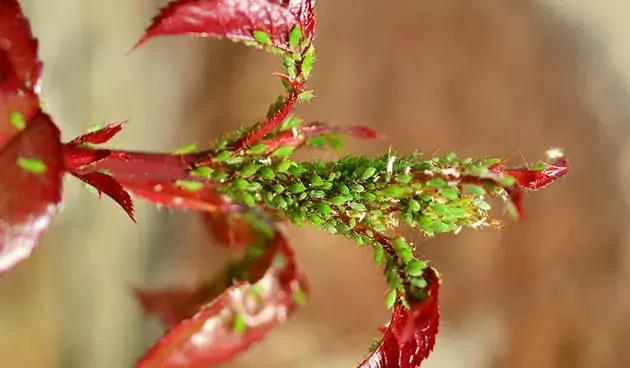Roses can be a joy to behold with their enchanting beauty and fragrance. However, the presence of aphids can quickly turn this idyllic image into a nightmare for gardeners. These tiny, sap-sucking pests can wreak havoc on your prized roses, causing wilting, distorted growth, and declining overall health.
Identifying Aphids on roses: The First Step
Aphids are soft-bodied insects that reproduce rapidly. Their sharp mouthparts pierce rose stems and leaves, feasting on the plant’s sap. This weakens the rose, hindering its growth and flower production.
Furthermore, aphids release a sugary substance known as honeydew, which entices the development of sooty mold. This compounds the detrimental impact on the roses’ overall health and visual appeal.
Early detection is critical. Look for these signs of an aphid infestation:
- Curled leaves: Aphids often target new growth, causing leaves to curl inwards.
- Yellowing foliage: As aphids feed, leaves lose their vibrant green color and turn yellow.
- Sticky residue: Honeydew leaves a shiny, sticky film on leaves and stems.
- Presence of the aphids: Look for clusters of tiny, soft-bodied insects, usually green, but sometimes brown, black, or yellow.

How Do I Get Rid of Aphids on My Roses?
1. Manual Removal: A Hands-On Approach
The simplest method to combat aphids is manual removal. Please wear gardening gloves and gently squash the aphids between your fingers or blast them off with a strong stream of water from a hose. This method is effective for a small infestation, but consistency is critical, as aphids reproduce rapidly.
2. Beneficial Insects: Nature’s Pest Control
Integrating indigenous predators into your garden can significantly alter the dynamics of pest control. Ladybugs, lacewings, and parasitic wasps are beneficial insects that feast on aphids. Consider releasing them strategically to establish a balanced ecosystem in your rose garden. You can find these predators at your local garden center or order them online.
3. Neem Oil: A Natural Deterrent
Neem oil, derived from the neem tree, is a potent organic remedy against aphids. It adeptly interferes with their feeding and reproductive mechanisms while preserving the well-being of beneficial insects. To deploy this solution, blend neem oil with water and a few drops of dish soap, then diligently apply the mixture to your roses, guaranteeing comprehensive coverage. Repeat this process every one to two weeks for optimal results.
Here’s a simple recipe:
Ingredients:
- 2 cups of water
- 1 teaspoon of liquid dish soap
- 1 teaspoon of neem oil
Instructions:
- Mix the water and dish soap in a spray bottle.
- Add the neem oil and shake well to combine.
- Spray the mixture on your roses, covering all parts of the plant.
This homemade bug spray targets aphids and serves as a preventive measure. For continued protection, apply it every two weeks or after rainfall.
4. Companion Planting: Nature’s Allies
Companion planting involves strategically placing plants that repel aphids near your roses. Marigolds, chives, and nasturtiums are excellent choices, emitting scents that deter aphids and other pests. Planting these companions alongside your roses adds diversity to your garden and a natural barrier against aphid invasions.
5. Introducing Beneficial Predators:
Mother Nature provides natural aphid assassins! Attract beneficial insects like ladybugs, lacewings, and minute pirate bugs to your garden. These predators love to feast on aphids, keeping their populations in check. You can buy ladybugs online or at garden centers and release them near your roses. Planting companion flowers with strong scents, like dill, fennel, and marigolds, can also attract these beneficial insects.

Maintaining a Healthy Rose Garden:
Healthy roses are more resistant to aphid infestations. Here are some tips:
- Proper Pruning: Regular pruning encourages air circulation and allows for better penetration of insecticidal sprays.
- Balanced Fertilization: Ensure your roses receive the proper nutrients, but avoid over-fertilizing with nitrogen, which promotes aphid growth.
- Encourage Diversity: Planting various flowers and herbs attracts beneficial insects that prey on aphids.
When Organic Methods Fall Short: Targeted Solutions
Sometimes, organic methods may not be enough to control a severe aphid infestation. In such cases, consider these targeted solutions:
- Insecticidal Soap: Commercially available insecticidal soaps are more potent than homemade solutions and offer faster aphid control. Follow the product label instructions carefully.
- Insecticidal Sprays: For large infestations, insecticidal sprays containing pyrethrin or insecticidal oil may be necessary. However, use these cautiously, as they can also harm beneficial insects. It is imperative to consistently don gloves and eye protection, strictly adhering to the instructions provided on the label.
Protecting Your Rose Haven
Implementing these techniques can effectively combat aphids and keep your roses thriving. Remember, combining organic methods, creating a healthy rose environment, and using targeted solutions when necessary is the key to a successful defense against these persistent pests.
Remember: Always test any new solution on a small, inconspicuous area of your rose bush before applying it to the entire plant. This helps you identify any potential reactions before widespread application.
With proper care and vigilance, your rose garden can remain a vibrant haven for beautiful blooms, free from the pesky clutches of aphids. Happy gardening!
Frequently Asked Questions
The time it takes to get rid of aphids depends on the severity of the infestation and the chosen control method. Organic methods take a few days to a week to show results, requiring repeated applications. Targeted solutions like insecticidal sprays can work faster, often within a day or two.
Left untreated, aphids can severely weaken your roses. They can stunt growth, reduce flower production, and make plants more susceptible to diseases. Additionally, the honeydew they secrete attracts other pests like ants, damaging the rose’s health.
Several other beneficial insects prey on aphids, including:
- Lacewings:These delicate green insects with lace-like wings have ferocious appetites for aphids.
- Minute Pirate Bugs:These tiny, fast-moving insects are voracious aphid predators.
- Hoverflies:Adult hoverflies resemble tiny wasps, but their larvae are the real aphid assassins.
Planting flowering herbs like dill, fennel, and coriander can attract these beneficial predators to your garden.
Recent Posts

Get Your Free Lunar Gardener's Calendar 2025!
Join the Lunar Gardening Revolution! Subscribe now to receive our exclusive Free Lunar Gardener’s Calendar for 2025. Harness the power of the moon to optimize your planting, nurturing, and harvesting.


